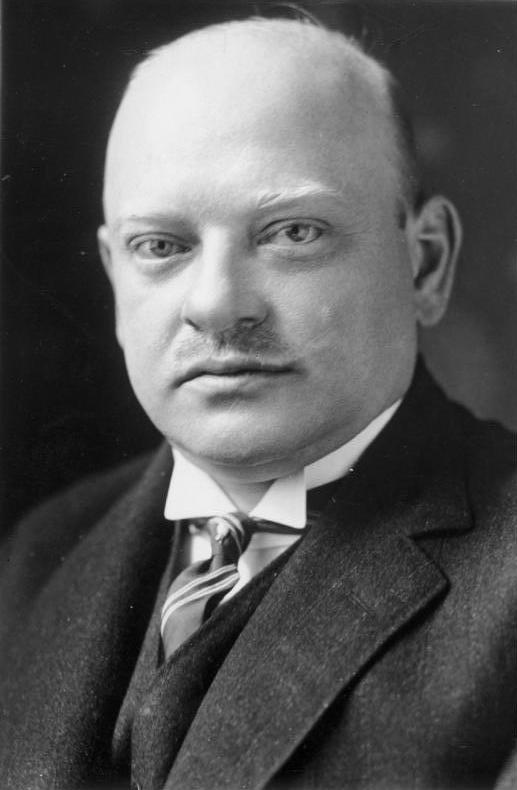Speech in the Reichstag (6 April 1916), quoted in W. M. Knight-Patterson, Germany. From Defeat to Conquest 1913-1933 (London: George Allen and Unwin, 1945), p. 75
1910s
Gustav Stresemann: Citáty v angličtine
1910s, Speech in the Reichstag, 18 March 1918
Letter to the ex-Crown Prince (24 October 1923), quoted in W. M. Knight-Patterson, Germany. From Defeat to Conquest 1913-1933 (London: George Allen and Unwin, 1945), pp. 328-329
1920s
1910s, Speech in the Reichstag, 18 March 1918
Speech to the People's Party Congress (11 October 1924), quoted in W. M. Knight-Patterson, Germany. From Defeat to Conquest 1913-1933 (London: George Allen and Unwin, 1945), p. 352
1920s
“Great Germany can only be created on a republican basis.”
Speech (13 April 1919), quoted in Jonathan Wright, Gustav Stresemann: Weimar's Greatest Statesman (Oxford University Press, 2004), p. 135
1910s
Diary entry (October 1927), quoted in W. M. Knight-Patterson, Germany. From Defeat to Conquest 1913-1933 (London: George Allen and Unwin, 1945), p. 412
1920s
Letter to the Chief of the National Liberal Party in Prussia, quoted in W. M. Knight-Patterson, Germany. From Defeat to Conquest 1913-1933 (London: George Allen and Unwin, 1945), p. 208, n. 2
1910s
Article for Zeit (20 April 1924), quoted in W. M. Knight-Patterson, Germany. From Defeat to Conquest 1913-1933 (London: George Allen and Unwin, 1945), p. 348
1920s
Remarks to Lord D'Abernon (17 October 1922), quoted in W. M. Knight-Patterson, Germany. From Defeat to Conquest 1913-1933 (London: George Allen and Unwin, 1945), p. 327
1920s
Letter to Rauscher (8 March 1924), quoted in Jonathan Wright, Gustav Stresemann: Weimar's Greatest Statesman (Oxford University Press, 2004), p. 269
1920s
“We regard the ultimate aim of our efforts as the establishment of a German popular monarchy.”
Interview with The New York Times (4 April 1924), quoted in W. M. Knight-Patterson, Germany. From Defeat to Conquest 1913-1933 (London: George Allen and Unwin, 1945), p. 347
1920s
Speech to the Congress of the People's Party in Hanover (March 1924), quoted in W. M. Knight-Patterson, Germany. From Defeat to Conquest 1913-1933 (London: George Allen and Unwin, 1945), pp. 346-347
1920s
Speech in the Reichstag (25 February 1918), quoted in W. M. Knight-Patterson, Germany. From Defeat to Conquest 1913-1933 (London: George Allen and Unwin, 1945), pp. 159-160
1910s
Speech in the Reichstag (6 June 1924) on foreign loans to Germany, quoted in W. M. Knight-Patterson, Germany. From Defeat to Conquest 1913-1933 (London: George Allen and Unwin, 1945), p. 348
1920s
Zdroj: 1910s, Speech in the Reichstag, 21 June 1918, p. 175
Letter to his sons (21 June 1919), quoted in Jonathan Wright, Gustav Stresemann: Weimar's Greatest Statesman (Oxford University Press, 2004), pp. 135-136
1910s
1910s, Speech in the Reichstag, 18 March 1918
Speech (1 April 1928), quoted in W. M. Knight-Patterson, Germany. From Defeat to Conquest 1913-1933 (London: George Allen and Unwin, 1945), p. 417
1920s
Speech in the Reichstag (19 February 1918), quoted in W. M. Knight-Patterson, Germany. From Defeat to Conquest 1913-1933 (London: George Allen and Unwin, 1945), pp. 149-150.
1910s
Zdroj: 1910s, Speech in the Reichstag, 21 June 1918, p. 175
Interruption from the Right: 'Yet you signed for fifty-one years'
Speech in the Reichstag (24 June 1929), quoted in W. M. Knight-Patterson, Germany. From Defeat to Conquest 1913-1933 (London: George Allen and Unwin, 1945), p. 438
1920s
Article (2 March 1924), quoted in W. M. Knight-Patterson, Germany. From Defeat to Conquest 1913-1933 (London: George Allen and Unwin, 1945), p. 318
1920s
Remarks to the Reichstag Committee of Foreign Affairs (7 October 1926), quoted in W. M. Knight-Patterson, Germany. From Defeat to Conquest 1913-1933 (London: George Allen and Unwin, 1945), p. 389
1920s
Stresemann to diplomat Sir Albert Bruce Lockhart in 1928
1920s
Remarks to representatives of the foreign press in Berlin (23 November 1923), quoted in W. M. Knight-Patterson, Germany. From Defeat to Conquest 1913-1933 (London: George Allen and Unwin, 1945), p. 341
1920s
1910s, Speech in the Reichstag, 18 March 1918
Zdroj: 1910s, Speech in the Reichstag, 21 June 1918, p. 179.
Zdroj: 1910s, Speech in the Reichstag, 21 June 1918, p. 179.
Speech in the Reichstag (19 February 1918), quoted in W. M. Knight-Patterson, Germany. From Defeat to Conquest 1913-1933 (London: George Allen and Unwin, 1945), pp. 149-150.
1910s
